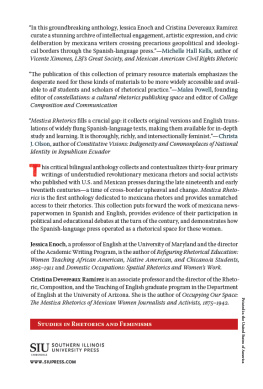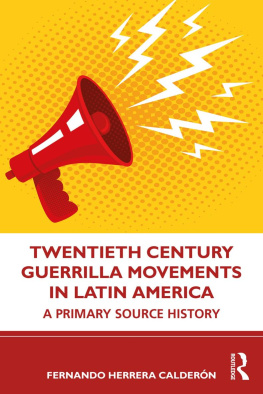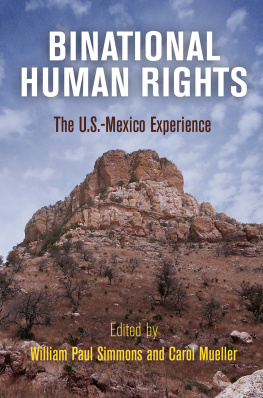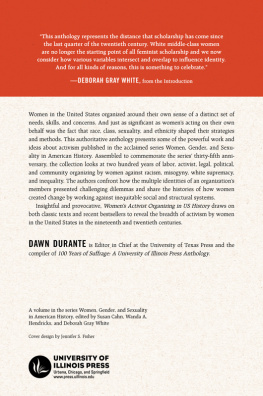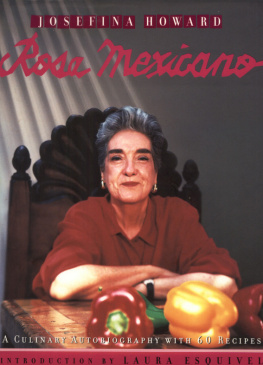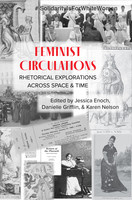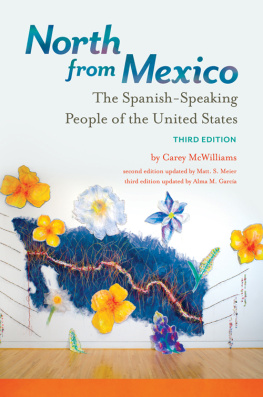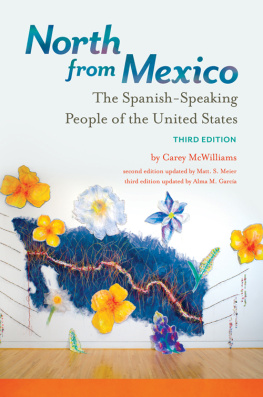MORE PRAISE FOR MESTIZA RHETORICS
Mestiza Rhetorics not only gives the field of feminist rhetorical and archival studies new primary works of Mexican rhetors; it also gives us ways to reexamine our assumptions about what rhetorical texts, texts in translation, and recovery work should look like. Kudos to Cristina D. Ramrez and Jessica Enoch for providing feminist rhetorical scholars with such a rich resource.
Jen Wingard, editor of Peitho: The Journal of the Coalition of Feminist Scholars in the History of Rhetoric and Composition
A rich and important example of the transborder feminist work of mexicana rhetors in the latter part of the twentieth century and the early twenty-first. This collection stunningly captures how these feminist rhetors had to engage a mestiza project to negotiate cross-border relationships, politics, national identities, and culture to enact their political projects. Mestiza Rhetorics is an important read not only for rhetorical scholars of history but also for those who want to better understand the history of our current political moment.
Rebecca Dingo, author of Networking Arguments: Rhetoric, Transnational Feminism, and Public Policy Writing
Mestiza Rhetorics presents an important collection of Mexican newspaperwomens original writings and their translations. Readers will appreciate this rich array of genres and styles that address womens rights, border politics and nationalism, and the role of Spanish language and the arts. Enoch and Ramrez offer multiple avenues for the analysis of these readings, making the collection both a necessary intervention in the rhetorical canon and a valuable scholarly resource.
Ellen Cushman, author of The Cherokee Syllabary: Writing the Peoples Perseverance
Studies in Rhetorics and Feminisms
Series Editors, Cheryl Glenn and Shirley Wilson Logan
Southern Illinois University Press
www.siupress.com
Copyright 2019 by the Board of Trustees, Southern Illinois University
All rights reserved
Printed in the United States of America
22 21 20 19 4 3 2 1
Cover illustration: Jovita Idar (center), image cropped and tinted; University of Texas at San Antonio Libraries Special Collections
Library of Congress Cataloging-in-Publication Data
Names: Enoch, Jessica, editor. | Ramrez, Cristina Devereaux, 1971 editor.
Title: Mestiza rhetorics : an anthology of Mexicana activism in the Spanish-language press, 18871922 / Jessica Enoch, Cristina Devereaux Ramrez.
Description: Carbondale, IL : Southern Illinois University Press, 2019. | Series: Studies in rhetorics and feminisms | Includes bibliographical references and index.
Identifiers: LCCN 2018054891 | ISBN 9780809337408 (paperback) | ISBN 9780809337415 (ebook)
Subjects: LCSH: WomenMexicoPolitical activitySources. | FeminismMexicoHistorySources. | WomenUnited StatesPolitical activitySources. | FeminismUnited StatesHistorySources. | BISAC: LANGUAGE ARTS & DISCIPLINES / Rhetoric. | SOCIAL SCIENCE / Womens Studies. | LANGUAGE ARTS & DISCIPLINES / Journalism. | SOCIAL SCIENCE / Ethnic Studies / Hispanic American Studies.
Classification: LCC HQ1463 .M49 2019 | DDC 305.420972dc23 LC record available at https://lccn.loc.gov/2018054891
Printed on recycled paper 
Acknowledgments
In all respects, Mestiza Rhetorics is a collaborative endeavor. First, we want to thank our translators Joel Bollinger Pouwels and Neil J. Devereaux. Joel Bollinger Pouwels carefully and meticulously transcribed and translated over 280 pages of Spanish-language text. We attribute a great deal of this projects success to Joels turn-of-the-twentieth-century Spanish-language expertise and extensive knowledge of mexicana history. Her help was indispensable. Even a translator needs an editor, and Neil J. Devereaux, who is also an expert in twentieth-century Spanish linguistics and Hispanic literature, dedicated himself to editing and revising Joels translations. Throughout the project, they answered our questions about turn-of-the-century history, language accuracy, and bilingual fluency. Beth Chapple helped move the anthology through its final stages, and her editorial translations were meticulous and thorough. Without all of their work, this project would have remained a dream.
We also must thank the archivists and librarians, as well as acknowledge the archives that were central to this project. The archivists at the University of Arizona helped to secure and find primary documents and also direct us to resources we did not know. Throughout this project, we consulted and drew from the digital archives at Arte Pblico Hispanic Historical Collection Series 1 and 2, and the subsidiary database Hispanic American Newspapers, 18081980, under the direction of Nicols Kanellos at the University of Houston. Other important databases for this anthology include Americas Historical Newspapers, Latin American Newspapers, Latin American Women Writers (LAWW), and the Hemeroteca Nacional Digital de Mxico. We deeply appreciate those who create, maintain, and grow these archives, and we are grateful for the permissions we received to publish the materials we culled from these resources.
While most of our collected entries were drawn from these archives, others were preserved by scholars through their individual collections and publications. Scholar Dra. Mara de Lourdes Alvarado y Martnez Escobar at Universidad Nacional Autnoma de Mxico gave us access to Laureana Wright de Kleinhanss Captulo xxi. La Lectura, and we gained permission to publish this piece from the Instituto de Investigaciones sobre la Universidad y la Educacin. Dra. Rosa Mara Valles Ruiz at Universidad Autnoma del Estado de Hidalgo allowed us to use her transcription of Hermila Galindos Laboremos! Dra. Patricia Galeana, Directora General del Instituto Nacional de Estudios Histricos de las Revoluciones de Mxico, gave permission to publish Ecce Homo! by Juana Beln Gutirrez de Mendoza and A qu venimos by AndreaVillarealtwo pieces published in Mujeres y Revolucin, 19001917, edited by Ana Lau Jaiven and Carmen Ramos-Escandn. The capacious intellectual generosity of these scholars was one of the most heartening and affirming aspects of this project.
In 2014, we were awarded with the Conference on College Composition and Communications Research Initiative Grant that propelled our work forward and funded every aspect of this project. We especially want to note how expensive translations are and can be: Mestiza Rhetorics would not have been possible without this grant. We hope CCCC continues to support translation and bilingual scholarship such as this.
Editors of the Feminisms and Rhetorics Series Cheryl Glenn and Shirley Wilson Logan championed this anthology and offered critical and helpful guidance from 2014 to the books completion. We deeply thank them for their support. Two anonymous reviewers offered insightful recommendations. We did our best to attend to each and every one, and the anthology is better for their suggestions. We especially want to acknowledge the hard and thoughtful work of Kristine Priddy, who saw this project through from beginning to end; its been a long process, and we appreciated (and even enjoyed!) taking every step with her.
We both depended on our families as we made our way through this project. Jesss three children have spent their early years hearing about Mestiza Rhetorics, watching their mother work and collaborate on iteven popping in to video conferences to say hello to Cristina. Their comic and loving relief in addition to the intellectual space and support from Scott Wible were invaluable to Jess. Cristina consistently turned to the Mexican linguistic and cultural heritage that grounds her immediate family. Her fluency in Spanish allowed her access to Mexican archives, archival documents, and connections with scholars and institutions in Mexico. Most importantly, she received endless support throughout this project in time and encouragement from her husband, Alejandro Ramrez.

